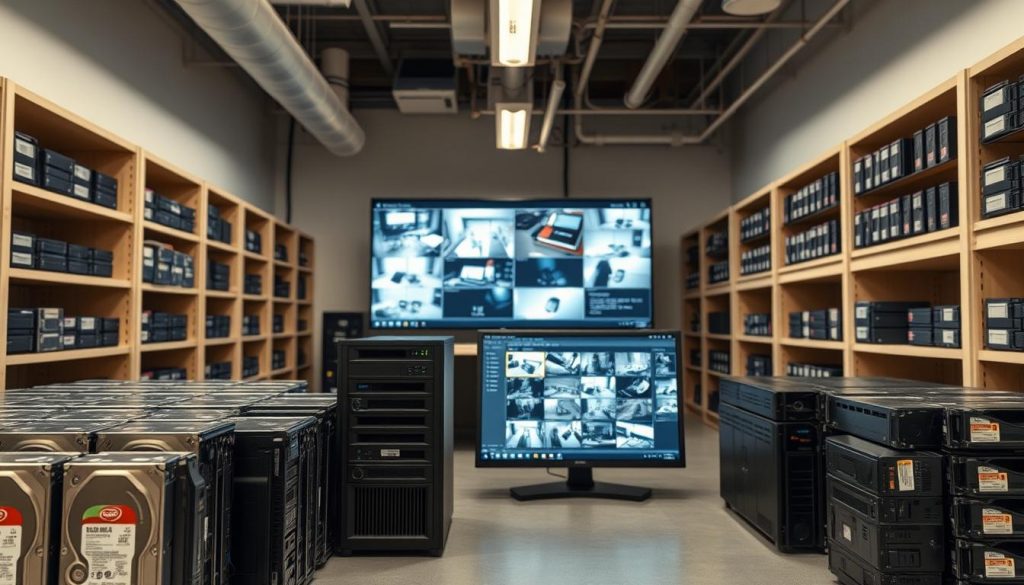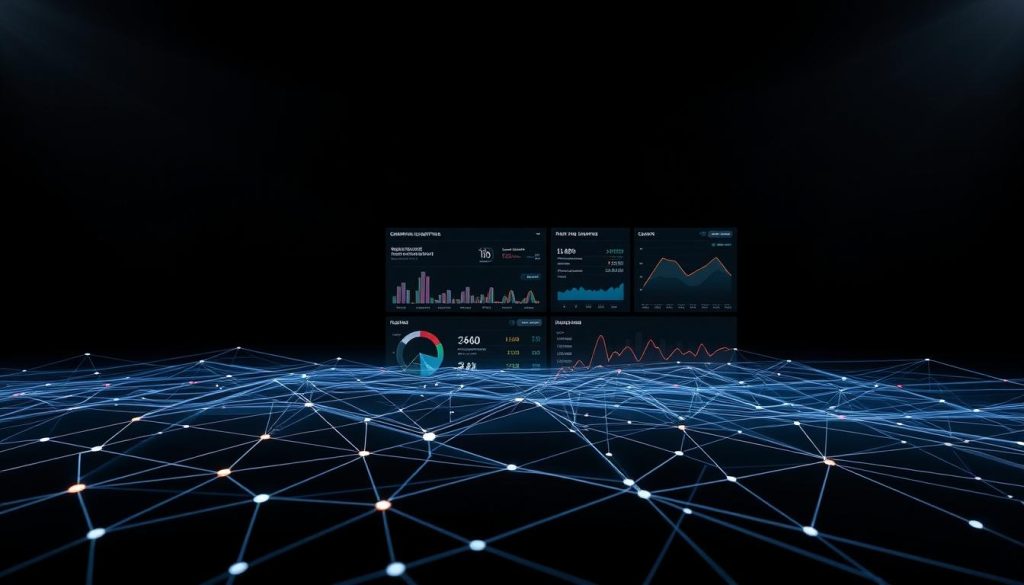CCTV cameras are becoming more common, making it important to know how much internet they use. This knowledge helps improve security at home and work. It also ensures that networks run smoothly.
The amount of internet used by CCTV cameras depends on several things. These include the quality of the video, how the footage is stored, and the network type. This section will explore these factors to help you get the most out of your CCTV system.
Key Takeaways
- Understanding daily data usage is critical for optimal CCTV operations.
- Factors like camera resolution significantly influence data consumption.
- Network type can alter the effectiveness and efficiency of CCTV systems.
- Video quality settings are directly related to internet usage levels.
- Data management strategies can enhance performance and reduce unnecessary costs.
Understanding Data Consumption of CCTV Cameras
Internet-connected cameras have changed how we watch over homes and businesses. They are key in keeping an eye on things. Knowing how much data CCTV cameras use is important for making them work better.
These cameras send data over Wi-Fi or 4G/5G. This lets users watch live and get alerts anytime, anywhere. But, how much data they use can change a lot.
Resolution and frame rate are big factors in data use. High-resolution cameras need more bandwidth because they make bigger files. Also, cameras that show more frames per second use more data. It’s important to manage these to save bandwidth and keep video surveillance effective.
By focusing on these details, users can control their CCTV data use better. This helps them set up systems that fit their needs. It ensures they get good coverage without using too much network.
Factors Influencing CCTV Internet Usage
It’s important to know what affects CCTV data usage. Key factors include camera resolution, frame rate, and compression technology. High-resolution cameras, like 4K, use more bandwidth than lower resolutions like 1080p.
The frame rate, or frames per second (FPS), also matters a lot. Cameras that record at higher frame rates use more data. For example, a camera at 30 FPS uses more data than one at 15 FPS.
Compression technology is key in managing data volume. Newer codecs, like H.265, use less bandwidth but keep video quality good. Older methods, like H.264, use more bandwidth and data. A good CCTV setup balances these factors for efficient data use.
How much Internet does CCTV use per day?
CCTV cameras are a common choice for security. But, it’s important to know how much internet they use every day. The camera’s resolution and frame rate are key factors. These elements affect how much bandwidth your cameras need.
Average Data Usage by Camera Resolution
The daily internet consumption of CCTV systems varies. For example:
- 720p cameras use between 0.5 to 1 GB per hour.
- 1080p cameras use about 1 to 3 GB per hour.
- 4K cameras, with their high definition, can use up to 6 GB per hour.
Choosing the right camera resolution is important. It depends on your needs and internet bandwidth.
Impact of Frame Rate on Data Consumption
The frame rate also affects daily internet consumption. Recording at a higher frame rate means more data. This makes the video smoother but uses more internet.
Motion detection systems use less data. They only record when there’s movement. This saves a lot of internet.
4G vs. Wi-Fi CCTV Cameras
When looking at security options, it’s key to compare 4G CCTV cameras and Wi-Fi security cameras. Each has its own features that impact how they work and how much data they use. 4G CCTV cameras use mobile data, making them work without needing local internet.
This is great for places without usual internet or power. Wi-Fi security cameras, on the other hand, need a steady power source and rely on Wi-Fi. They often use the data from home internet plans. But, they might struggle with network problems, which can hurt their performance.
The data use between these cameras can differ a lot. For example, 4G CCTV cameras might need special mobile data plans, mainly if they’re set to high resolution. Wi-Fi cameras, though, can use less data if their settings and resolution are right.
Looking at data use, we see big differences among models and settings. This shows why picking the right camera depends on your security needs and where you’ll use it.
Video Compression Techniques and Their Effect on Data
Video compression is key for managing data in CCTV systems. H.264 has been a top choice because it saves data without losing too much quality. But, H.265 is now a big step forward, improving performance and cutting down storage and bandwidth needs.
Using H.265 can cut data use by 30-50% compared to H.264. This means you can record and send high-quality video using less data. This helps users save on bandwidth and storage. Choosing CCTV cameras with these new techs can greatly improve system efficiency.
Using these compression methods means you don’t have to choose between good video quality and saving data. Knowing the differences between these formats helps when picking CCTV systems.
Storage Options for CCTV Footage
Choosing the right storage for your CCTV footage is key. You have two main options: local storage and cloud storage. Each has its own pros and cons, so picking the best one for you is important.
Local vs. Cloud Storage
Local storage uses devices like external hard drives or DVRs to keep footage on-site. It’s reliable because you don’t need the internet to access it. But, it might not be as convenient as cloud storage.
Cloud storage lets you view your footage from anywhere with internet. It’s handy but can use a lot of data and cost money.
Choosing the Right Storage Capacity
When picking a storage option, think about how much space you need. You should know how much data you use every day. This helps you choose a recorder with enough space for all your footage.
This way, you won’t run out of space and miss important moments caught by your cameras.

Daily Internet Consumption of Different Resolutions
As we need better video surveillance, knowing how resolution affects CCTV daily data consumption is key. Different camera resolutions change how much data is sent each day. This affects how much internet we use.
A 720p camera uses about 15 GB of data daily. This is good for places that don’t need super clear video. On the other hand, a 1080p camera uses up to 48 GB daily. It gives clearer images and is perfect for important security needs.
Ultra HD or 4K cameras are the top of the line. They use up to 100 GB of data daily. They offer the best clarity but can be hard on networks, even with just one camera.
Choosing the right camera depends on your security needs and network setup. Knowing how much data you need helps pick the best CCTV system. It also helps manage your data use well.
Use Cases Impacting Data Usage
CCTV systems have many uses, and knowing how they use data is key to better bandwidth use. Home and commercial CCTV systems use data differently. Home systems might record only when needed, while commercial ones record all the time.
Home Surveillance vs. Commercial Applications
Home CCTV systems protect places like driveways or front doors. They use less data because they record only when something moves. Commercial CCTV systems, like those in stores or warehouses, record all the time. This means they use a lot more data.
- Home installations usually utilize less data due to their focus on critical areas and intermittent recording.
- Commercial setups require consistent monitoring, which leads to higher data consumption.
- Specialized features such as remote access or video analytics further increase data usage in business environments.
It’s important to know the difference between home and commercial CCTV systems. This knowledge helps in choosing the right bandwidth and storage for your system.
Strategies for Minimizing Data Usage
As surveillance needs grow, finding ways to cut down CCTV data use is key. Using smart strategies can help use your bandwidth well while keeping things secure. With the right tech, you can get great results without breaking the bank on data plans.
Implementing Motion Detection
One top motion detection strategy is to make your CCTV system only record when it sees movement. This cuts down on useless footage, saving a lot of data. For example, setting cameras to turn on during certain times or events can really help with saving data.
Optimizing Recording Settings
Another smart way to reduce data use is by tweaking your recording settings. Lowering quality when it’s dark can save a lot of bandwidth. Also, adjusting frame rate and resolution to fit your monitoring needs helps manage data better. This all adds up to less data needed overall.
Calculating Your CCTV Data Needs
Figuring out your CCTV data needs is important. You need to think about how many cameras you’ll use, their resolution, how long you’ll record, and the activity level. Each of these factors affects your system’s bandwidth and storage needs.
To figure out your monthly data use, a simple formula can help. Multiply the bit rate of each camera by the seconds in a month, then by the number of cameras. This helps you understand your data needs better, ensuring your internet can handle your cameras.
In short, knowing how to calculate your CCTV data needs is key for a good security system. By knowing your monthly data needs, you can make sure your internet is strong enough. This avoids issues like slow footage or missed recordings. It makes your CCTV system more reliable and efficient.

